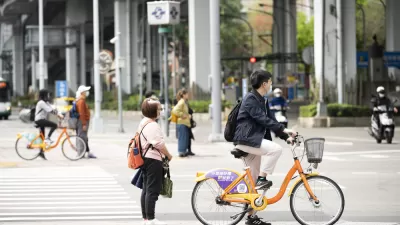If you forget to bring a bag, pay a dime for either a paper or reusable plastic bag. Single-use plastic bags will disappear from grocery stores and pharmacies on July 1, convenience and liquor stores a year later. A composting bill was also signed.
The plastic bag ban, the nation's first resulting from state legislation, is a result of Gov. Jerry Brown signing Sen. Alex Padilla's (D-San Fernando Valley) SB 270 on Sept. 30, the last day for him to sign or veto bills. The bill "set off one of the fiercest lobbying battles in the Capitol this year," write Patrick McGreevy and Melanie Mason of the Los Angeles Times.
In fact, as noted a month ago, the bill had died but was resurrected three days later after a union and grocery chain came to an agreement on how the bag revenue would be spent.
In his signing statement, Gov. Brown said, "This bill is a step in the right direction – it reduces the torrent of plastic polluting our beaches, parks and even the vast ocean itself. We’re the first to ban these bags, and we won’t be the last."
Indeed, Climate Progress reported in March on an attempt by New York City council members, not the first, to institute a city-wide ban. A coalition of groups has formed to advocate a ban.
New Yorkers currently throw away 5.2 billion plastic bags per year, which costs the city $10 million a year to transport the waste to landfills.
Chicago, Austin and Seattle already have such bans, reports The Associated Press. And contrary to some media headlines, including ours last month, Hawaii instituted a plastic bag ban two years earlier, as Stateline via Governing notes, though it was not the result of state legislation.
The Sacramento Bee reports that the plastics industry will attempt to reverse the legislation via a 2016 ballot measure.
Minutes after Brown announced signing the bill, an industry group called the American Progressive Bag Alliance vowed to begin collecting signatures in an effort to overturn the law via a referendum on the 2016 ballot. They filed a request for title and summary later in the day.
Another bill signed by Gov. Brown may have more impact, weight-wise, in reducing the state's waste that goes to landfills, though it has received scant media attention. AB 1826, by Assembly Member Wesley Chesbro (D-North Coast) "will require businesses to separate their food scraps and yard trimmings for composting or anaerobic digestion," according to Californians Against Waste
"This is huge news for California, and is expected to lead to major growth in the state’s composting and anaerobic digestion infrastructure," states Nick Lapis, their legislative coordinator.
“In fact, food is the most prevalent item in the disposed waste stream and over 40% of all material going to landfills is readily compostable or anaerobically digestible. This is simply unacceptable, and it is irresponsible of us to waste this valuable material.”
"AB 1826 will help the state meet its objective of recycling 75 percent of all waste by the year 2020, as established by AB 341, which Chesbro authored in 2011," states Chesbro's press release.
FULL STORY: Statewide ban on disposable plastic bags is signed into law by Brown

Study: Maui’s Plan to Convert Vacation Rentals to Long-Term Housing Could Cause Nearly $1 Billion Economic Loss
The plan would reduce visitor accommodation by 25,% resulting in 1,900 jobs lost.

Alabama: Trump Terminates Settlements for Black Communities Harmed By Raw Sewage
Trump deemed the landmark civil rights agreement “illegal DEI and environmental justice policy.”

Why Should We Subsidize Public Transportation?
Many public transit agencies face financial stress due to rising costs, declining fare revenue, and declining subsidies. Transit advocates must provide a strong business case for increasing public transit funding.

Paris Bike Boom Leads to Steep Drop in Air Pollution
The French city’s air quality has improved dramatically in the past 20 years, coinciding with a growth in cycling.

Why Housing Costs More to Build in California Than in Texas
Hard costs like labor and materials combined with ‘soft’ costs such as permitting make building in the San Francisco Bay Area almost three times as costly as in Texas cities.

San Diego County Sees a Rise in Urban Coyotes
San Diego County experiences a rise in urban coyotes, as sightings become prevalent throughout its urban neighbourhoods and surrounding areas.
Urban Design for Planners 1: Software Tools
This six-course series explores essential urban design concepts using open source software and equips planners with the tools they need to participate fully in the urban design process.
Planning for Universal Design
Learn the tools for implementing Universal Design in planning regulations.
Smith Gee Studio
Alamo Area Metropolitan Planning Organization
City of Santa Clarita
Institute for Housing and Urban Development Studies (IHS)
City of Grandview
Harvard GSD Executive Education
Toledo-Lucas County Plan Commissions
Salt Lake City
NYU Wagner Graduate School of Public Service




























